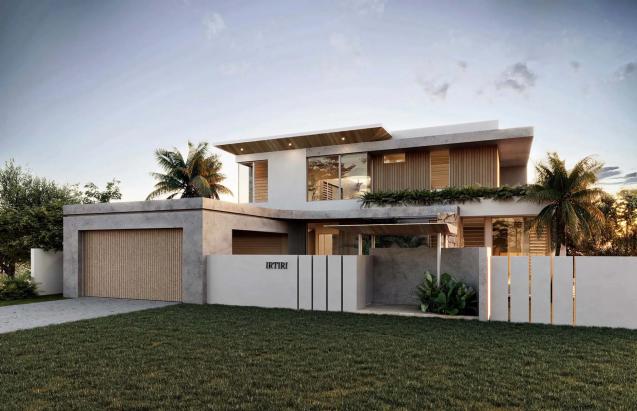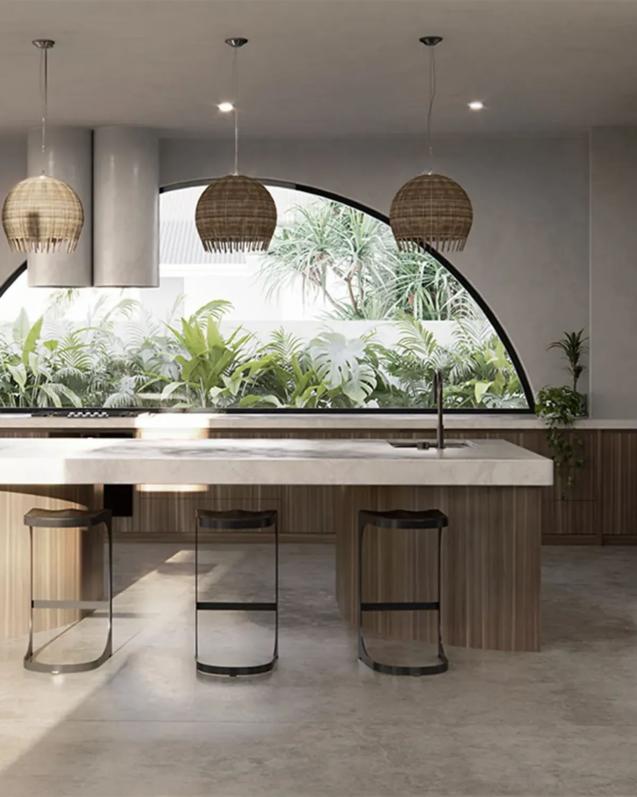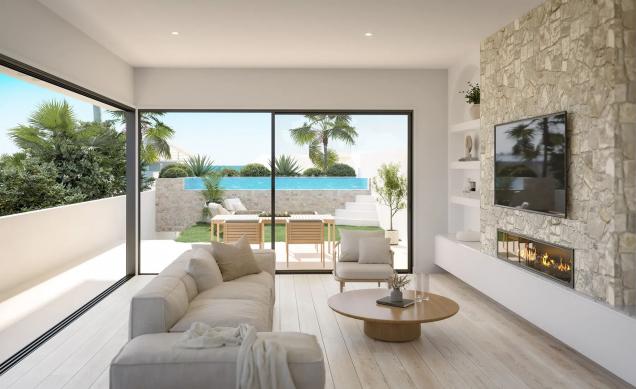
How to Choose a Custom Home Builder
By Unique Built|February 22, 2024
In custom home building, the foundation of your dream home is not just made of bricks and mortar, but of the right choices and informed decisions. You're not just about to build a house, but to craft a personal sanctuary that resonates with your lifestyle and aspirations.
Choosing a custom home builder isn't like picking out a new sofa for your living room. It's a decision that demands more than a casual flip through a catalogue or a few swipes on a touchscreen. You're investing in your future. And for the engineers among us, you know it's not just about aesthetics; it's about precision, functionality, and the fine balance between form and structure. Here, you'll find a blend of professional insights and practical advice, tailored to arm you with the knowledge and confidence to choose a builder who can turn your vision into a reality.
Prioritising what matters to you most
Understanding your personal needs and the scope of your project is not just a step in the process – it's the blueprint for your success. This is where you take a moment, step back, and really think about what you need, want, and can't live without.
The Importance of Personal Needs and Project Scope
If you don't know what you want, how can you expect your builder to deliver it? You're not just looking for someone who can lay bricks and hammer nails; you're looking for a partner who can bring your vision to life. And for the engineers reading this, remember, this is where functionality meets form. It’s your playground to innovate and push boundaries.
The Checklist: Must-Haves and Nice-to-Haves
The checklist isn't your everyday grocery list; it's the key to your dream home.
Checking the Builders’ Credentials
Alright, you're now stepping into the role of a detective – a Brisbane custom home builder detective, to be precise.
It's time to channel your inner Sherlock Holmes as you scrutinise a builder's credentials. This is about reading between the lines to uncover the true story behind those glossy portfolio images and polished testimonials.
Step 1: Check the Portfolio
Hold on, this isn't just a casual scroll through a gallery of pretty houses. Look for variety and complexity in their projects. Have they tackled a range of styles and sizes? Does their work show adaptability and creativity? You want a versatile builder, not a one-trick pony.
Step 2: The Background Check
Next, it’s time for a background check – and no, not the type you might be thinking. This is where you verify their qualifications, licensing, and any industry awards. It's like checking the credentials of a doctor before a major surgery; you want to ensure they're not just legal but also lauded for their work. A builder without the right licenses is like a chef who can’t tell salt from sugar – not someone you want in charge of your dream home.
Step 3: Customer Feedback
This is where your detective skills really come into play. Don’t just skim the surface of those star ratings. Read the stories behind them. Look for comments about communication, problem-solving, and adherence to timelines and budgets. Remember, a review saying “nice job” is good, but one that details the journey, challenges overcome, and the triumphs along the way is gold.
Step 4: Spotting Red Flags
Here's where your keen eye for detail comes in. Be on the lookout for red flags. Are there gaps in their project history? Do they shy away from giving references? If it feels like they're more elusive than a celebrity avoiding paparazzi, take note.
Step 5: The Timeline and Budget Analysis
Consider how they handle timelines and budgets in past projects. Are they more punctual than a Swiss train? Do they treat your budget with the care of a master jeweller handling precious gems? This is crucial – you want a builder who respects your time and money.
Aligning Visions with Builders
You know how in dating, it's all about finding someone who 'gets' you? Well, choosing a home builder is strikingly similar. It’s not just about their skills or how many five-star reviews they boast. It’s about finding someone whose design philosophy dances to the beat of your drum.
The Philosophy behind the Hammer and Nails
A builder's design philosophy is their blueprint for viewing and shaping the world of construction and design. It's what guides their decisions, from the materials they prefer to the architectural styles they excel in. This is crucial for you, whether you're meticulously planning each room or you're more concerned about the structural integrity and sustainability of your build.
Why does this matter? Because a mismatch in philosophy can lead to a final product that's as off-key as a rock band at a classical concert. You want a builder who not only understands your vision but shares your enthusiasm for it.
Knowing Your Style
Before you even meet potential builders, it’s vital to understand your own style preferences. Are you a fan of the sleek lines of modern architecture, or does the warmth of traditional designs make you feel at home? Maybe you're an engineer who appreciates the functionality and innovation of high-tech homes.
To help you pinpoint your style, consider these questions:
Budgets and Timelines
Let's talk money and time – the two things we never seem to have enough of.
You're about to make one of the biggest investments of your life, and it's not just about choosing the right tiles for the kitchen backsplash. We're talking cold, hard cash and the sands of time.
Budgeting without Breaking a Sweat
You know, that pesky little thing that can make or break your dream home project. Here's the deal: a well-planned budget is your roadmap to success. It’s not just about how much you can spend; it’s about allocating your funds wisely.
Everyone wants their dream home built yesterday, but rushing can lead to mistakes that are more than just a typo in an email.
Choosing a custom home builder isn't like picking out a new sofa for your living room. It's a decision that demands more than a casual flip through a catalogue or a few swipes on a touchscreen. You're investing in your future. And for the engineers among us, you know it's not just about aesthetics; it's about precision, functionality, and the fine balance between form and structure. Here, you'll find a blend of professional insights and practical advice, tailored to arm you with the knowledge and confidence to choose a builder who can turn your vision into a reality.
Prioritising what matters to you most
Understanding your personal needs and the scope of your project is not just a step in the process – it's the blueprint for your success. This is where you take a moment, step back, and really think about what you need, want, and can't live without.
The Importance of Personal Needs and Project Scope
If you don't know what you want, how can you expect your builder to deliver it? You're not just looking for someone who can lay bricks and hammer nails; you're looking for a partner who can bring your vision to life. And for the engineers reading this, remember, this is where functionality meets form. It’s your playground to innovate and push boundaries.
The Checklist: Must-Haves and Nice-to-Haves
The checklist isn't your everyday grocery list; it's the key to your dream home.
- Must-Haves: These are your non-negotiables. Maybe it's a spacious kitchen for those family gatherings or an energy-efficient design to reduce your carbon footprint. Or perhaps, for the secret superhero in you, it's that hidden room behind the bookshelf – hey, we don't judge.
- Nice-to-Haves: These items are your cherries on top. A built-in wine cellar, an outdoor kitchen, or maybe smart home technology that makes life a breeze. While you can live without them, they sure would make life sweeter.
- Deal Breakers: What are your absolute no-gos? It could be anything from a certain type of material to a specific design style. Recognising these upfront can save you from headaches down the road.
Checking the Builders’ Credentials
Alright, you're now stepping into the role of a detective – a Brisbane custom home builder detective, to be precise.
It's time to channel your inner Sherlock Holmes as you scrutinise a builder's credentials. This is about reading between the lines to uncover the true story behind those glossy portfolio images and polished testimonials.
Step 1: Check the Portfolio
Hold on, this isn't just a casual scroll through a gallery of pretty houses. Look for variety and complexity in their projects. Have they tackled a range of styles and sizes? Does their work show adaptability and creativity? You want a versatile builder, not a one-trick pony.
Step 2: The Background Check
Next, it’s time for a background check – and no, not the type you might be thinking. This is where you verify their qualifications, licensing, and any industry awards. It's like checking the credentials of a doctor before a major surgery; you want to ensure they're not just legal but also lauded for their work. A builder without the right licenses is like a chef who can’t tell salt from sugar – not someone you want in charge of your dream home.
Step 3: Customer Feedback
This is where your detective skills really come into play. Don’t just skim the surface of those star ratings. Read the stories behind them. Look for comments about communication, problem-solving, and adherence to timelines and budgets. Remember, a review saying “nice job” is good, but one that details the journey, challenges overcome, and the triumphs along the way is gold.
Step 4: Spotting Red Flags
Here's where your keen eye for detail comes in. Be on the lookout for red flags. Are there gaps in their project history? Do they shy away from giving references? If it feels like they're more elusive than a celebrity avoiding paparazzi, take note.
Step 5: The Timeline and Budget Analysis
Consider how they handle timelines and budgets in past projects. Are they more punctual than a Swiss train? Do they treat your budget with the care of a master jeweller handling precious gems? This is crucial – you want a builder who respects your time and money.
Aligning Visions with Builders
You know how in dating, it's all about finding someone who 'gets' you? Well, choosing a home builder is strikingly similar. It’s not just about their skills or how many five-star reviews they boast. It’s about finding someone whose design philosophy dances to the beat of your drum.
The Philosophy behind the Hammer and Nails
A builder's design philosophy is their blueprint for viewing and shaping the world of construction and design. It's what guides their decisions, from the materials they prefer to the architectural styles they excel in. This is crucial for you, whether you're meticulously planning each room or you're more concerned about the structural integrity and sustainability of your build.
Why does this matter? Because a mismatch in philosophy can lead to a final product that's as off-key as a rock band at a classical concert. You want a builder who not only understands your vision but shares your enthusiasm for it.
Knowing Your Style
Before you even meet potential builders, it’s vital to understand your own style preferences. Are you a fan of the sleek lines of modern architecture, or does the warmth of traditional designs make you feel at home? Maybe you're an engineer who appreciates the functionality and innovation of high-tech homes.
To help you pinpoint your style, consider these questions:
- What kind of spaces make you feel most comfortable? Think about the homes or buildings where you’ve felt an instant connection.
- What are your non-negotiables? This could be anything from large windows for natural light to an eco-friendly design.
- How do you want to feel in your home? Safe, inspired, cozy, or maybe all of the above?
Budgets and Timelines
Let's talk money and time – the two things we never seem to have enough of.
You're about to make one of the biggest investments of your life, and it's not just about choosing the right tiles for the kitchen backsplash. We're talking cold, hard cash and the sands of time.
Budgeting without Breaking a Sweat
You know, that pesky little thing that can make or break your dream home project. Here's the deal: a well-planned budget is your roadmap to success. It’s not just about how much you can spend; it’s about allocating your funds wisely.
- Set Your Priorities Straight: List down what you absolutely need in your home versus the nice-to-haves. Yes, that wine cellar sounds amazing, but is it more important than a functional home office?
- Get Real with Costs: Do some homework. Research the average costs of home projects in your area. Knowledge is power, and in this case, it’s also a safeguard against overspending.
- Expect the Unexpected: Always keep a buffer in your budget. Think of it as your financial safety net for those “just in case” moments. You'll thank me later when you encounter an unexpected expense.
- Communication is Key: Be upfront with your builder about your budget. A transparent conversation from the get-go can save you from headaches down the road.
Everyone wants their dream home built yesterday, but rushing can lead to mistakes that are more than just a typo in an email.
- Quality Takes Time: Remember, Rome wasn't built in a day, and your dream home deserves the same patience. A timeline that’s too tight can compromise the quality of work.
- Set Realistic Expectations: Talk to your builder about a realistic timeframe. Factor in everything from planning to the last lick of paint.
- The Weather Factor: Nature doesn’t always play nice. Bad weather can delay construction, so factor in some buffer time for when Mother Nature decides to throw a tantrum.
- Keep an Eye on Progress: Regular check-ins with your builder are crucial. It keeps everyone on their toes and ensures that the project stays on track.



